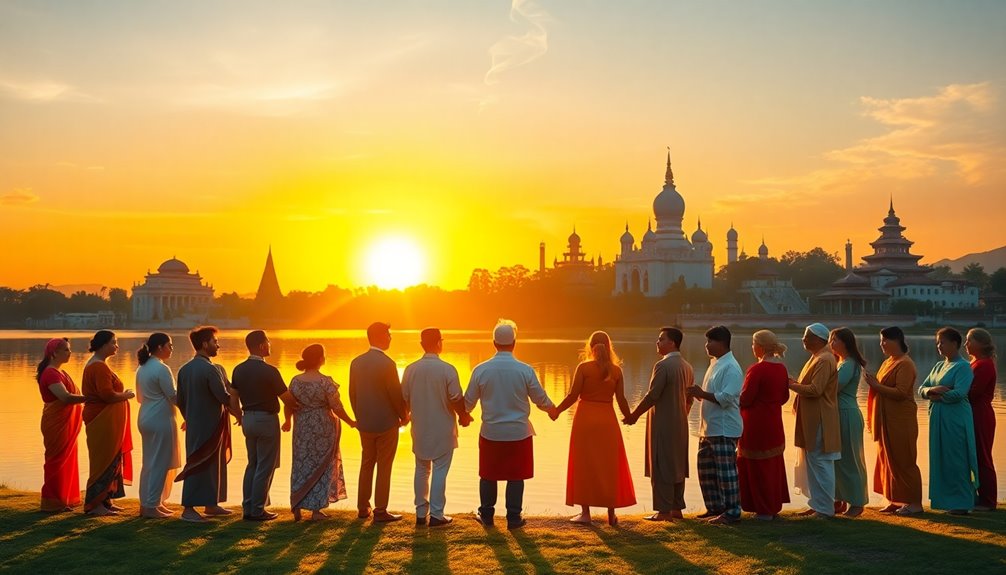Religion and spirituality serve different yet complementary purposes in your quest for meaning. Religion offers an organized system of beliefs and community support, while spirituality emphasizes personal experience and exploration. Both aim to provide a sense of purpose, fostering emotional resilience and mental well-being. The modern landscape shows a rise in individuals identifying as "spiritual but not religious," blending elements from various traditions. Understanding these distinctions can enrich your personal journey and connections with others. If you're curious about how these practices impact your growth and community involvement, you might discover more insights along the way.
Key Takeaways
- Religion is an organized system of beliefs and practices, while spirituality focuses on individual experiences and personal connections to the sacred.
- Many individuals identify as both religious and spiritual, seeking community support and personal growth simultaneously.
- Spirituality often promotes mental health benefits through practices like meditation, while religion provides moral guidance and communal support.
- Both religion and spirituality evolve with cultural and historical contexts, reflecting humanity's ongoing quest for meaning and purpose.
- Each person's spiritual journey is unique, fostering self-discovery and resilience through personal exploration and transformative experiences.
Definitions of Religion and Spirituality
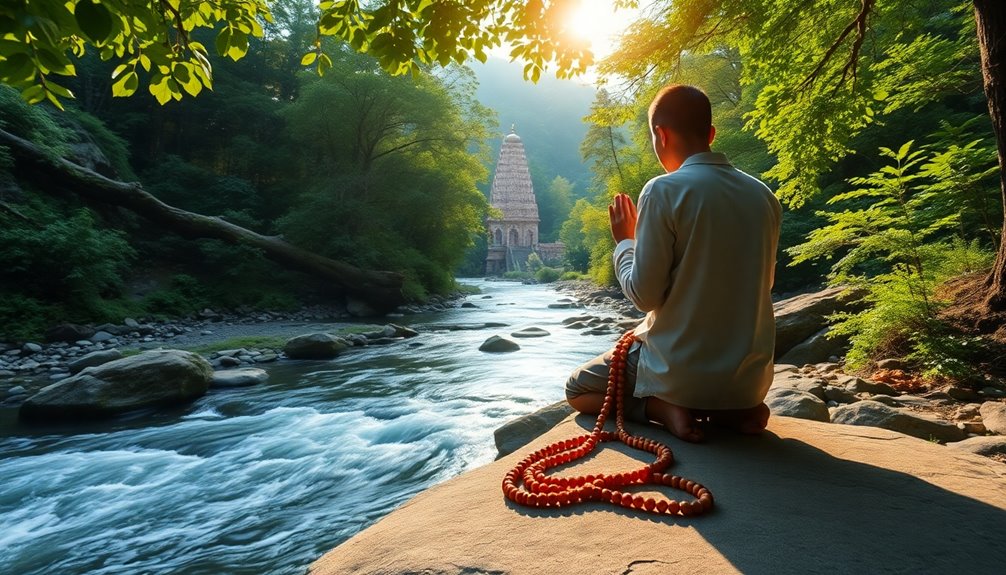
Religion and spirituality often coexist in people's lives, yet they represent distinct concepts. Religion is typically defined as an organized system of beliefs, practices, and rituals that a community shares. It includes established doctrines, collective worship, and a sense of belonging among followers.
In contrast, spirituality emphasizes personal experiences and individual beliefs about the sacred. It's about your unique journey of discovery, allowing you to explore your beliefs without the constraints of structured dogmas that often accompany organized religion.
Surveys show that 65% of Americans identify as both religious and spiritual, highlighting how these concepts can intertwine. While religion tends to provide a communal framework for understanding life's meaning, spirituality promotes personal interpretation and the pursuit of inner truths.
Both domains center around the quest for meaning and purpose, but they approach this search differently. Religion offers community and tradition, while spirituality invites you to investigate your own experiences and beliefs.
Recognizing these distinctions can enrich your understanding of how religion and spirituality influence your life and the lives of those around you.
Exploring the Relationship
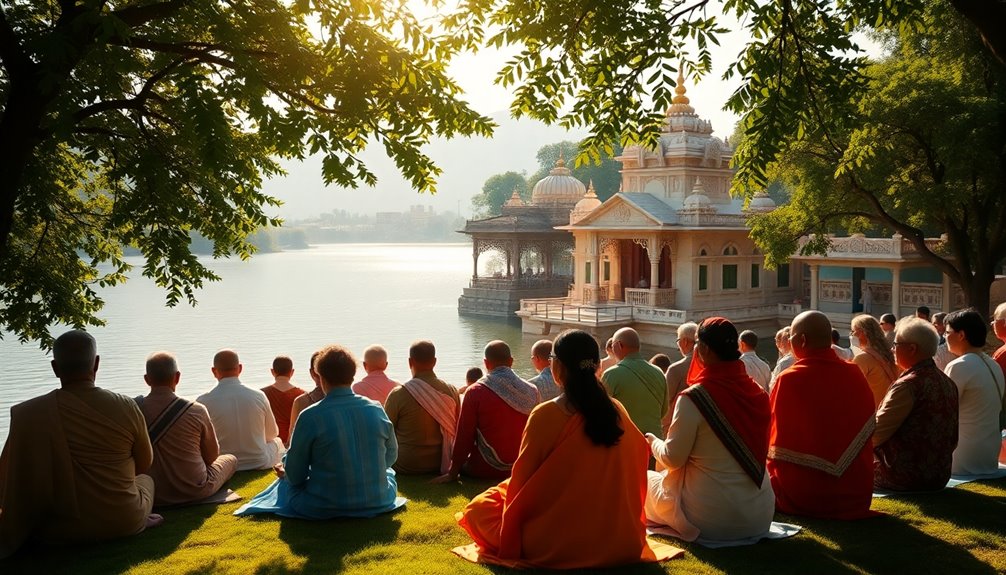
How do religion and spirituality intertwine in your life? You might find that they're not opposed but complement each other in your quest for meaning and purpose. Many people, around 65% of Americans, identify as both religious and spiritual, illustrating a rich interplay between the two.
While religion often involves communal practices and established doctrines, spirituality emphasizes your personal experiences and interpretations of the sacred. This relationship can deepen your connection to something greater, allowing you to explore diverse pathways toward fulfillment.
You may turn to religious rituals for community support during difficult times while relying on your spiritual beliefs to navigate personal challenges. Both spirituality and religion can enhance your psychological well-being, acting as effective coping mechanisms that elevate life satisfaction. Additionally, music, such as classical music, has been shown to improve focus and emotional regulation, which can further enrich your spiritual experience.
Your journey may involve ongoing discovery and transformation, reflecting how these two aspects influence your understanding of existence. Embracing both spirituality and religion can lead to a more holistic approach to life, enriching your sense of self and the world around you.
Psychological Aspects
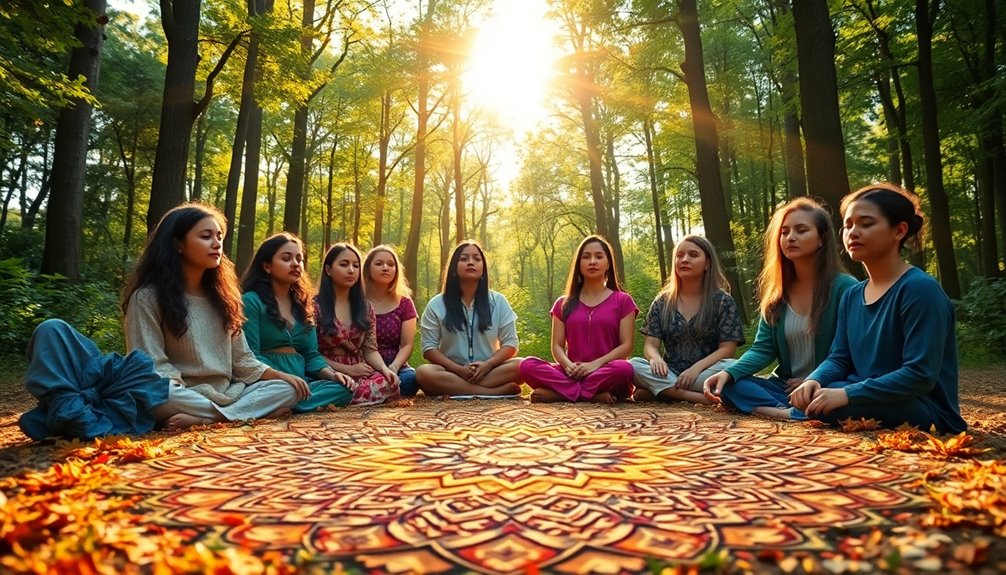
The interplay between spirituality and religion profoundly shapes your psychological landscape. Research shows that spirituality is linked to positive mental health outcomes, promoting resilience and life satisfaction. Both spirituality and religious practices can be effective coping strategies during crises, aiding in psychological stability and reducing anxiety. Spiritual practices like meditation and mindfulness considerably lower stress levels, enhancing overall well-being. Additionally, engaging in nighttime meditation can further enhance relaxation and improve sleep quality, contributing to mental clarity.
To illustrate the psychological aspects of spirituality and religion, consider the following table:
| Aspect | Spirituality | Religion |
|---|---|---|
| Coping Mechanism | Meditation, mindfulness | Prayer, rituals |
| Community Support | Personal connections | Organized congregations |
| Psychological Benefit | Increased resilience, satisfaction | Sense of belonging, identity |
| Stress Reduction | Lower anxiety, peacefulness | Emotional support during crises |
| Personal Growth | Self-discovery, inner peace | Moral guidance, community values |
Engaging in these practices can considerably enhance your mental health, providing a sense of purpose and belonging. Spirituality and religion together create a robust support system, fostering individual identity and resilience in the face of life's challenges.
Cultural and Historical Context

Throughout history, humanity's search for meaning has shaped both spirituality and religion in profound ways. The development of organized religion is deeply rooted in historical teachings and scriptures, influenced by various cultural traditions. Major religions like Christianity, Islam, Hinduism, Buddhism, and Judaism emerged over centuries, often reflecting their societal contexts.
Here are some key factors illustrating this connection:
- Cultural Traditions: Each religion incorporates unique cultural elements, adapting to local customs and practices.
- Historical Teachings: Foundational texts and teachings from figures like Buddha and Jesus emphasize personal experience and spiritual exploration.
- Evolution of Beliefs: The decline of organized religion since the Enlightenment has led many to identify as "spiritual but not religious" (SBNR), seeking individualized paths.
- Blending of Traditions: Modern spirituality often mixes elements from various religions, showing how cultural influences can create new forms of belief.
Understanding these aspects helps you appreciate how spirituality and religion evolve together, often reflecting the changing landscapes of human thought and culture.
Personal Experiences and Growth

Your journey of spiritual growth often unfolds through personal insights and transformative life experiences.
As you reflect on these moments, you discover new layers of understanding about yourself and your connection to the universe.
This exploration not only shapes your beliefs but also enhances your overall sense of fulfillment.
Spiritual Growth Journeys
Initiating a spiritual growth journey can be a transformative experience, often leading you to explore your inner self and the universe in profound ways.
As you commence on this path, you'll discover how spirituality brings deeper life satisfaction and enhances your overall well-being.
Here are some key aspects to reflect upon:
- Self-Discovery: Engaging in practices like meditation and mindfulness allows you to connect with your inner self, fostering personal exploration.
- Resilience: You'll develop coping strategies that help you navigate life's challenges, contributing to a stronger sense of purpose and meaning.
- Continual Exploration: Spiritual growth encourages you to question and explore your beliefs, leading to transformative insights about your existence.
- Individualized Journey: Each person's path is unique, and your experiences may shift over time as you evolve and learn.
Personal Insights and Reflections
Personal insights often illuminate the path of spiritual growth, revealing how individual experiences shape your understanding of the universe. As you explore your spirituality, especially if you identify as spiritual but not religious, you'll likely find practices like meditation and mindfulness invaluable. These practices foster your individual autonomy, allowing you to define your beliefs and connect with the divine on your terms.
Engaging in various spiritual practices can greatly enhance your psychological well-being, nurturing resilience and reducing anxiety. This journey often leads to seeking personal truths and fostering connections with others who share your experiences. In this shared space, you discover a sense of belonging and community.
Here's a table that highlights emotional aspects of your spiritual journey:
| Emotional Aspect | Experience | Growth Outcome |
|---|---|---|
| Self-Discovery | Exploring personal beliefs | Greater clarity in your values |
| Resilience | Overcoming challenges through faith | Enhanced coping strategies |
| Connection | Building relationships with others | A deeper sense of belonging |
| Mindfulness | Practicing presence in the moment | Increased inner peace |
| Purpose | Seeking meaning in daily life | A profound sense of fulfillment |
Your personal insights contribute to a richer spiritual narrative, guiding your path forward. By cultivating a growth mindset, you can embrace your spiritual journey as a continuous process of learning and self-discovery.
Transformative Life Experiences
Transformative life experiences often act as catalysts for profound personal growth and spiritual exploration. These pivotal moments can lead you to question your beliefs, values, and your spiritual path. Engaging deeply with these experiences can open new avenues for self-discovery.
Here are some common transformative life experiences that might guide your journey:
- Loss: The death of a loved one can push you to seek deeper meaning in life.
- Trauma: Surviving a traumatic event often compels you to reassess your life's priorities and beliefs.
- Joy: Profound moments of happiness can inspire gratitude and a desire for connection with the universe.
- Mindfulness Practices: Engaging in meditation or mindfulness can enhance resilience and provide clarity during challenging times.
Research shows that about 65% of Americans identify as both religious and spiritual, highlighting how these transformative experiences intertwine with both frameworks. Additionally, engaging with intense emotional responses can also catalyze your spiritual journey, as seen in those who experience profound personal challenges.
When you embrace these moments, you may find a greater sense of purpose and fulfillment, allowing your spiritual journey to flourish and evolve.
Spirituality Beyond Religion

You might find that your personal experiences of divinity extend beyond traditional religious practices.
Exploring non-religious avenues like meditation or mindfulness can lead to profound insights and connections.
Embracing these spiritual paths allows you to craft a unique belief system that resonates with your individual journey.
Personal Experiences of Divinity
Throughout history, countless individuals have sought connections to the divine outside the boundaries of organized religion, exploring spirituality as a deeply personal journey. You may find that personal experiences of divinity often emphasize individual exploration, contrasting with the collective experiences typical of organized faiths.
Here are some key aspects to reflect upon:
- Individual Exploration: Spirituality invites you to explore your unique path, encouraging personal interpretation and questioning.
- Meditation and Mindfulness: These practices can deepen your connection to higher powers or the universe, fostering intimacy with the divine.
- Open-Mindedness: Spirituality cultivates curiosity and flexibility, allowing you to engage with experiences without rigid dogmas.
- Personal Transformation: Many who identify as spiritual but not religious report profound changes in their lives through unique practices, leading to fulfillment.
Research shows that engaging in spiritual practices can boost mental health, lowering anxiety and enhancing life satisfaction.
Exploring Non-Religious Practices
Exploring spirituality beyond traditional religious frameworks opens up a diverse array of practices that emphasize personal growth and inner transformation. Non-religious practices like meditation, mindfulness, and yoga allow you to cultivate a deep sense of well-being without the constraints of structured religious doctrines.
Many people today identify as "spiritual but not religious" (SBNR), seeking personal meaning and connection outside conventional beliefs. This path encourages exploration and questioning, enabling you to draw from various beliefs and practices, including insights from science, philosophy, and psychology.
Contemporary movements, such as New Age spirituality, stress personal experiences and the interconnectedness of all beings, often blending elements from different cultures and traditions to enrich your spiritual journey.
Research shows that engaging in these spiritual practices can lead to improved mental health outcomes, including increased resilience and reduced anxiety. By embracing non-religious practices, you open yourself up to a world of possibilities that promote self-discovery, emotional healing, and a deeper connection with yourself and the universe.
Ultimately, this exploration allows you to define your spirituality on your own terms, fostering a fulfilling and transformative experience.
The Role of Community
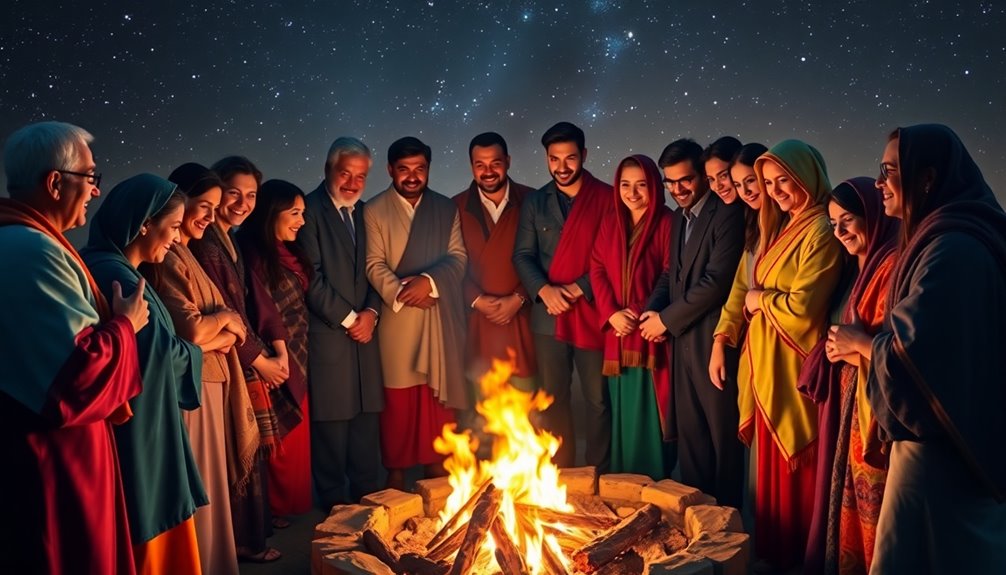
While many people seek personal growth through spirituality, the role of community in religion offers a vital support system that enhances individual well-being. Being part of a religious community can provide you with a structured environment for collective worship and shared beliefs, fostering connections that contribute to your mental health.
Here are some key aspects of how community plays a role in religion:
- Collective Worship: Participating in group rituals and services strengthens your social ties and sense of belonging.
- Shared Beliefs: Being surrounded by like-minded individuals reinforces your values and provides a foundation for support.
- Social Activities: Engaging in communal events helps build relationships and fosters a sense of identity within the group.
- Emotional Support: Research shows that being involved in religious communities correlates with lower anxiety and depression levels, highlighting the importance of social support.
Though spirituality emphasizes individual experiences, it can still thrive in communal settings.
Ultimately, both religion and spirituality offer pathways for individuals to seek purpose, meaning, and connection through community engagement.
Future Perspectives on Spirituality

As the landscape of spirituality evolves, many individuals are moving away from traditional religious affiliations, opting instead for a more personal and flexible approach. You might identify as "spiritual but not religious" (SBNR), embracing a path that resonates with your unique beliefs. This shift reflects a growing desire for connection with a higher power that aligns with your values and experiences.
In today's world, you'll find spirituality increasingly integrated into holistic health practices, enhancing overall well-being and mental health. Mindfulness and meditation are gaining traction as essential tools for personal growth and self-discovery, often blending scientific principles with spiritual practices. This fusion encourages you to explore deeper meanings in your life beyond material concerns.
Moreover, interfaith dialogues are fostering unity and understanding among diverse beliefs, allowing you to appreciate different spiritual traditions. As you navigate these evolving perspectives, the ongoing exploration of consciousness invites you to question existence itself, prompting a search for deeper truths.
The future of spirituality is yours to shape, offering endless possibilities for connection, growth, and understanding in an ever-changing world.
Frequently Asked Questions
What Is the Connection Between Religion and Spirituality?
You'll find that religion and spirituality often intertwine, each enriching the other.
Religion provides structure and community, while spirituality offers personal interpretation and individual experience.
When you engage with both, you can deepen your understanding of life's purpose and meaning.
Many people draw from religious traditions to shape their spiritual beliefs, allowing for growth and exploration beyond rigid doctrines.
Ultimately, this connection fosters a more profound sense of well-being and fulfillment in your life.
What Is Your Understanding of the Concept of Religion and Spirituality?
Your understanding of religion and spirituality can be quite nuanced.
Religion often involves structured beliefs, rituals, and community practices that guide followers in their faith. On the other hand, spirituality emphasizes personal experiences and connections with the sacred, allowing for individual exploration.
Both concepts seek meaning and purpose in life, but while religion can offer a communal framework, spirituality invites you to commence on your own unique journey of self-discovery and understanding.
What Are the Differences and Similarities Between Spirituality and Religion?
Imagine standing at a crossroads, one path leading to structured rituals and community, the other to personal exploration and self-discovery.
Spirituality and religion differ in their approaches; spirituality embraces individual journeys, while religion offers collective beliefs and practices.
Yet, both seek meaning and purpose in life. You might find a sense of belonging in a community or through personal experiences, highlighting the interconnectedness of these two profound aspects of human existence.
How Is Spirituality Understood in the Religion?
In religion, spirituality's often understood as your personal journey to connect with something greater.
You find meaning through rituals, prayers, and community gatherings that help deepen that connection.
While you follow established teachings, you're encouraged to explore your own experiences and interpretations.
This blend of personal exploration within a structured framework can enhance your well-being, offering support through shared practices, while also allowing you to discover sacred truths uniquely.
Conclusion
In the vibrant tapestry of life, religion and spirituality weave together threads of meaning and connection. By embracing both, you can explore profound paths of personal growth and understanding. As you journey through traditions and transcendental experiences, remember that each individual's quest shapes their unique story. So, whether you seek solace in sacred spaces or the serenity of self-discovery, keep an open heart. The future of spirituality beckons with boundless beauty and boundless possibilities.
